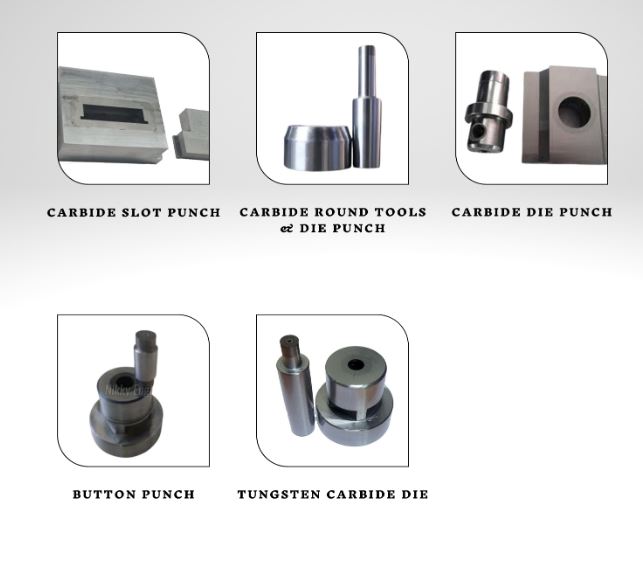Carbide Die
We are a Carbide Die manufacturer in India. Nikky Tools Carbide Die, we uncover a realm of precision and efficiency that goes beyond the ordinary. This introduction sets the stage for an exploration of the features, benefits, and applications that make Nikky Tools Carbide Die an essential tool in various industrial processes.

Types of carbide Die :
1.Round Carbide Dies:
Designed for cylindrical applications, round carbide dies are widely used in industries where precise shaping and forming of materials are essential.
2. Hexagonal Carbide Dies:
Hexagonal carbide dies to find applications in industries that require materials to have six-sided shapes. These dies are adept at creating hexagonal profiles with precision.
3. Rectangular Carbide Dies:
Specifically crafted for applications requiring materials with rectangular cross-sections, these dies ensure accuracy and consistency in shaping.
4. Thread Carbide Dies:
Essential in the production of threaded components, thread carbide dies by Nikky Tools are engineered to deliver precise and uniform threading.
5. Drawing Carbide Dies:
Drawing carbide dies are designed for wire drawing processes, where materials are pulled through a die to reduce their diameter. Nikky Tools’ drawing carbide dies to ensure a smooth and controlled drawing process, maintaining material integrity.
Carbide Die vs. Steel Die:
1. Hardness:
Carbide Die:
Carbide dies are renowned for their exceptional hardness, surpassing that of steel. This hardness contributes to increased wear resistance and a longer lifespan.
Steel Die:
While steel is hard, it generally doesn’t match the hardness level of carbide. Steel dies may wear out more quickly under heavy use.
2. Wear Resistance:
Carbide Die:
Carbide exhibits superior wear resistance, making it ideal for high-volume production where the die encounters constant friction and pressure.
Steel Die:
Steel dies have good wear resistance but may not withstand grinding materials or extreme conditions as well as carbide.
3. Toughness:
Carbide Die:
Carbide is naturally tough, allowing it to endure high pressures and stresses without compromising its structural integrity.
Steel Die:
Steel is tough but may be more inclined to deformation or cracking under extreme conditions compared to carbide.
4. Versatility:
Carbide Die:
Carbide dies are versatile, and suitable for a wide range of applications due to their hardness and wear resistance.
Steel Die:
Steel dies are versatile but may not perform as effectively in high-stress or abrasive environments compared to carbide.
5. Cost:
Carbide Die:
Carbide dies often have a higher upfront cost, but their longer lifespan and consistent performance can result in cost savings over time.
Steel Die:
Steel dies typically have a lower upfront cost but may require more frequent replacements, impacting long-term costs.
6. Heat Resistance:
Carbide Die
Carbide exhibits excellent heat resistance, maintaining its properties even under elevated temperatures generated during metalworking processes.
Steel Die:
Steel has good heat resistance but may not perform as well as carbide in extreme heat conditions.
7. Customization:
Carbide Die:
Carbide allows for intricate customizations, making it suitable for creating dies with specific profiles, threads, or shapes.
Steel Die
Steel dies can be customized to some extent but may have limitations compared to the precision achievable with carbide.
The choice between carbide dies and steel dies ultimately depends on the specific needs of your application. Carbide is the go-to choice for high-precision, high-volume production where durability and wear resistance are paramount. Steel, on the other hand, maybe more suitable for applications with less demanding conditions or for those with budget constraints.
NIKKY TOOLS is designed with specific features to meet diverse industrial needs, ensuring precision, durability, and optimal performance in various manufacturing processes.
